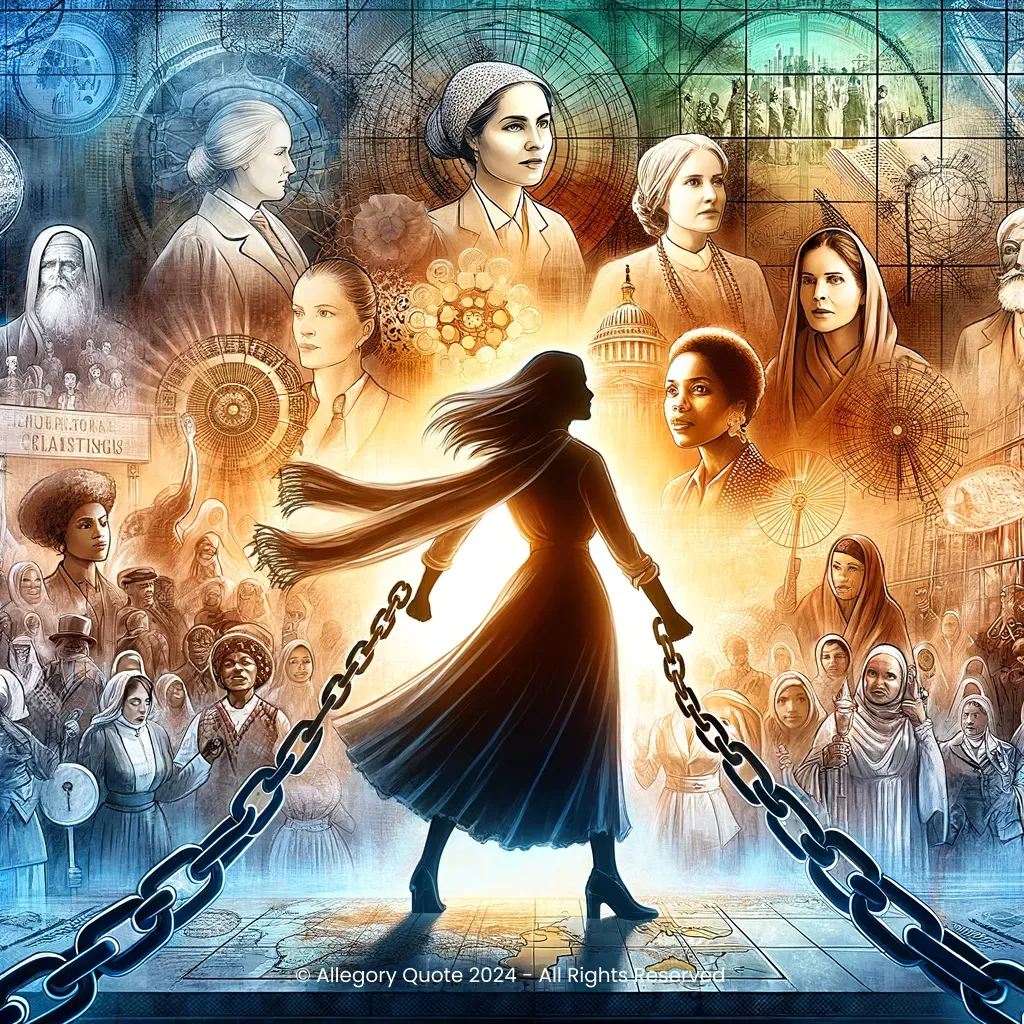Well-behaved women seldom make history

0
0
0
0
- Meaning
- This phrase suggests that women who adhere to conventional behaviors and expectations—those who are "well-behaved" in the traditional sense—are less likely to be celebrated or remembered for their accomplishments. Instead, it is often those who challenge the status quo, break boundaries, and defy societal norms who make significant impacts and thus, make history. The phrase underscores how unconventional actions or rebellion against societal norms can lead to lasting change and recognition.
- Allegory
- The elements in the image include the powerful female figure breaking invisible chains, symbolizing liberation from societal norms. The historical monuments and landmarks represent the wide-reaching impact across different cultures and eras. The glowing silhouettes of trailblazing women symbolize solidarity and the collective strength of women who made history by challenging conventions. The transition from dull to vibrant hues signifies the progress and recognition achieved through such defiance, underscoring the transformative impact of bold actions.
- Applicability
- The phrase encourages individuals, especially women, to challenge societal expectations and strive for their goals, even if it means breaking away from traditional roles. Whether in personal or professional life, the message can be applied to motivate people to take risks, advocate for themselves and others, and pursue innovation and change. It reminds people that making a significant impact often requires going against the grain.
- Impact
- This phrase has had a profound impact on contemporary culture and feminist movements. It has been used to inspire and empower women globally, encouraging them to challenge societal expectations. The phrase is often cited in discussions about women's rights, empowerment, and history. It has also been widely featured in popular culture, including merchandise like T-shirts, mugs, and posters, serving as a rallying cry for many who advocate for gender equality and social change.
- Historical Context
- The phrase originated in the 1970s, a period marked by the feminist movement which sought to address and rectify gender inequalities. During this era, there was a significant push for the recognition of women's rights and contributions across various fields. Laurel Thatcher Ulrich's work and this phrase are reflections of the evolving discourse on gender roles and the recognition of women's impact throughout history.
- Criticisms
- Criticisms include the argument that the phrase may imply that quiet or less rebellious women do not contribute significantly to history, which is not necessarily true. Some argue that there are many ways to make a difference, and not all impactful actions involve defiance or rebellion. Additionally, some suggest it could perpetuate a binary view of behavior, oversimplifying the complex nature of societal change and personal influence.
- Variations
- Variations of this phrase exist, especially reflecting cultural perspectives. In different cultural contexts, the phrase might emphasize varying aspects of women's behavior and their impact. Some interpretations may highlight the importance of collaborative, behind-the-scenes efforts that are equally valuable even if less publicly recognized.
-

Good things come to those who wait.
-

Gratitude is not only the greatest of virtues, but the parent of all others.
-

The bad news is time flies. The good news is you're the pilot.
-

I took the one less traveled by, and that has made all the difference.
-

Wrinkles should merely indicate where smiles have been.
-

A foolish consistency is the hobgoblin of little minds.
-

After me, the flood.
-

Yes we can.
-

You are entitled to your own opinions, but not your own facts.
-

If you would be loved, love, and be lovable.
-

Don't dream it. Be it.
-

You never know how strong you are, until being strong is your only choice.
No Comments